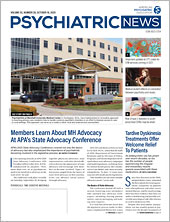“One of the important things I’ve learned from mindfulness is self-compassion,” says Andrea (not her real name), a 58-year-old patient at the Cambridge Health Alliance (CHA) in Cambridge, Mass.
Andrea has a history of disabling migraine, exacerbated by stress and anxiety. But this year, at the recommendation of her primary care physician, she enrolled in CHA’s eight-week virtual mindfulness workshop.
(Cambridge Health Alliance is a Harvard-affiliated community health system and accountable care organization that includes two hospitals and a network of primary and specialty care centers serving more than 140,000 patients in Cambridge, Somerville, and Boston’s metro-north communities.)
“It was really important for me to learn that the patterns of thought and the reactions of my body that were contributing to anxiety and to my migraines were not personal failings, but were my mind and my body responding to situations the only way they knew how,” Andrea told Psychiatric News.
She is learning a new way. “We find ourselves in situations, and without consciously knowing it, we respond in various ingrained ways, the ways our bodies and minds have learned to respond in the past. Mindfulness really teaches you to be in the moment, without judgment, so you can slow down long enough to make a conscious choice about how you react.”
The workshop, “Mindfulness-Based Cognitive Therapy Skills for Resilience (MBCT-R) During COVID-19,” is a population health initiative effort aimed at anticipating what clinicians at CHA see as a tsunami of mental health needs arising from the pandemic.
CHA had already been offering Mindfulness-Based Cognitive Therapy through its Mindful Mental Health Service clinic for groups of up to 12. With the onset of the global COVID-19 pandemic, psychiatric leaders at CHA decided they would have to expand the offering.
Research by CHA Chief of Psychiatry (and former APA director of research) Philip Wang, M.D., Dr.Ph., on mental health needs in the wake of Hurricane Katrina 15 years ago bore findings that are ominous for 2020: An enormous number of people who had never previously had mental health care experienced an onset of symptoms of depression, anxiety, and substance use disorders yet never sought out treatment.
“Our psychiatric team, in collaboration with the Center for Mindfulness and Compassion, decided that we needed to proactively do more to help people in our community cope with the inordinate amount of stress and change brought about by COVID-19,” said Zev Schuman-Olivier, M.D., director of the CHA Center for Mindfulness and Compassion. “The question we were facing is, ‘How do we prepare for something similar to the aftermath of Katrina when our system is already stressed to capacity?’ ”
Using Zoom technology, he and colleagues expanded the workshops to up to 50 participants, offering them for free to all of CHA’s enrolled health care members and staff and to the public for a tuition of $650. The CHA Center for Mindfulness and Compassion offers needs-based scholarships, including the Black, Indigenous, and People of Color (BIPOC) scholarship, which provides 10 scholarship spots for each eight-week workshop.
CHA merged its mindfulness offering with a mental health monitoring and support program, known as CHA MindWell. Offered as an option to all adult primary care patients enrolled in CHA, MindWell employs the Computerized Adaptive Test for Mental Health (CAT-MH), an online questionnaire that screens patients for psychiatric disorders and monitors severity of symptoms over time.
For patients in need, including those participating in the mindfulness workshops, participation in CHA MindWell allows for time-sensitive, phone-based coaching or referral to outpatient mental health services.
“There was no precedent for doing mindfulness with 50 people on a computer screen,” said psychiatrist Carl Fulwiler, M.D., Ph.D., director of the Mindfulness-Based Cognitive Therapy (MBCT) Training Program at the Center for Mindfulness and Compassion. “So we have reconceived it as a psychoeducational tool built around mindfulness.”
He adapted the curriculum of MBCT—which has an extensive evidence base supporting its effectiveness in preventing relapse in recurrent depression—to focus especially on the problems and challenges associated with the pandemic: isolation, fear of infection, distress about loved ones, and anxiety about employment and finances.
Each of the eight workshops is two hours long and consists of three parts: an educational didactic about various topics such as how depressed mood can trigger negative thoughts, which in turn exacerbate depression; a 30- to 40-minute mindfulness session, during which a particular kind of mindfulness is practiced (for example, body scan, sitting meditation, mindful walking, and mindful movement); and an “inquiry” session during which participants can share their experience of the mindfulness practice. Each set of eight workshops also includes one weekend “retreat” (also virtual).
Between workshops, participants are given at-home practice assignments, such as practicing eating at least one meal mindfully.
Data from the first three months of program enrollment showed significant reductions in depression and anxiety using CAT-MH: a 34% reduction in depression scores and a 41% reduction in anxiety scores.
Fulwiler said that in response to the pandemic, CHA’s mindfulness offering along with CHA MindWell and CAT-MH is turning the normal clinical paradigm on its head. “Normally, we wait in our office for people to come to us and say ‘I’m depressed.’ Here we are taking primary and secondary prevention out to the community.”
He added, “It’s the most gratifying clinical work I do. It empowers people to draw on their own strengths to help themselves.”
Andrea is sold on mindfulness and said she will enroll in another eight-week workshop. She manages stress better and says her migraines have diminished in number and severity. “After a class I feel quieter,” she said. “It’s as if I have replanted my feet and reestablished my center of gravity mentally.
“It gives me the space to not feel pressured to fix something in the moment, but to sit with my feelings. I can choose how I react. The more you are able to sit with something, the more thoughtful you can be in your response.” ■
More information about the MBCT-R workshop and registration is posted
here.
Information about the CHA Center or Mindfulness and Compassion is posted
here.

